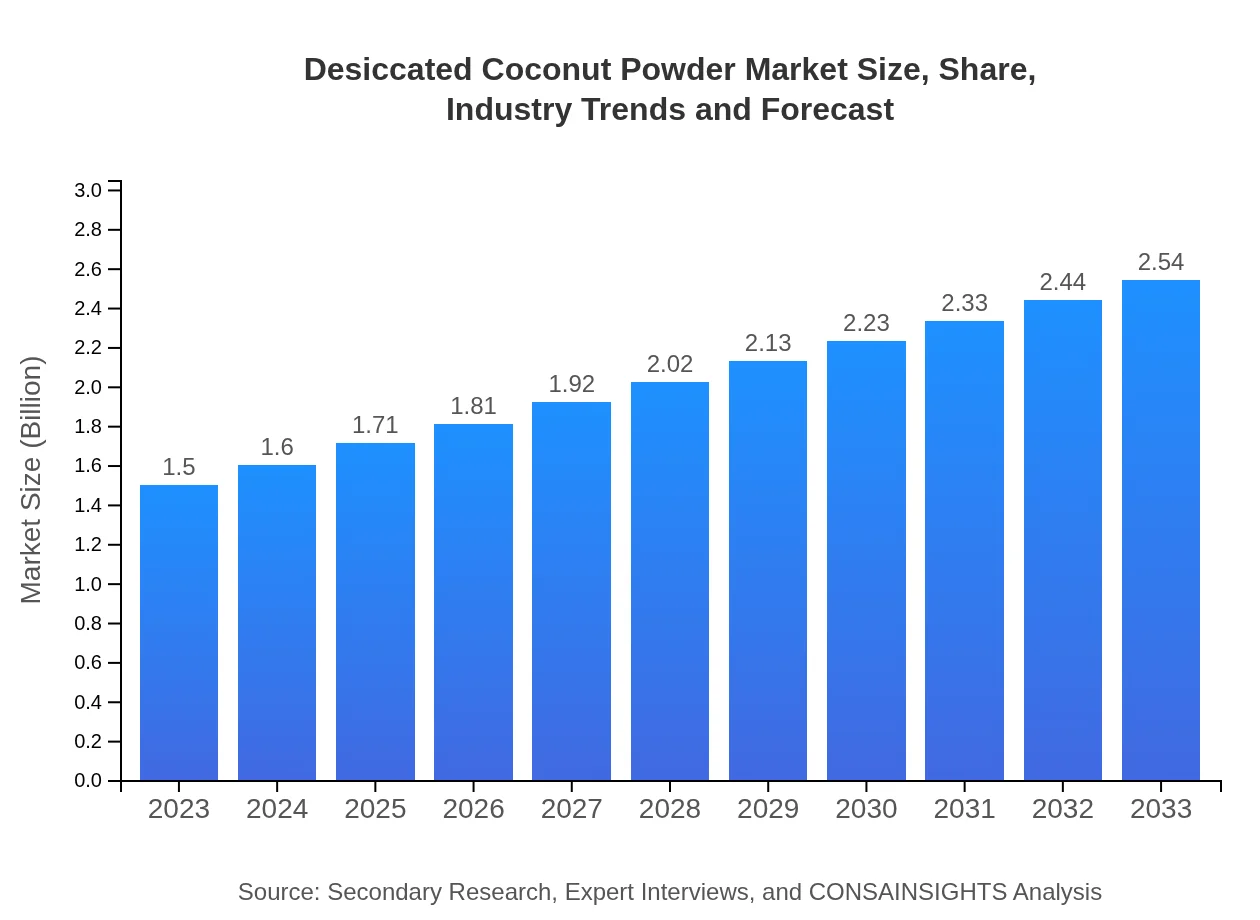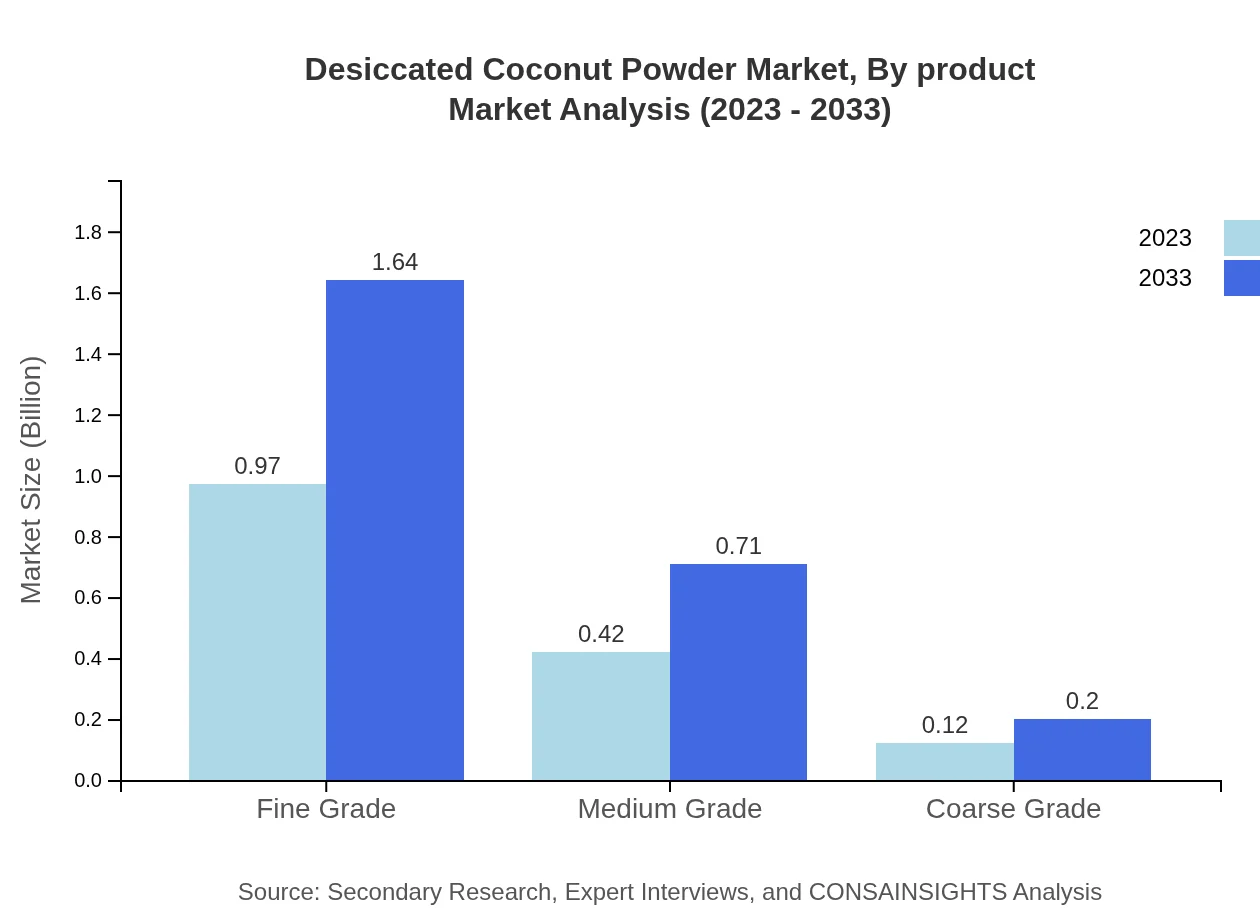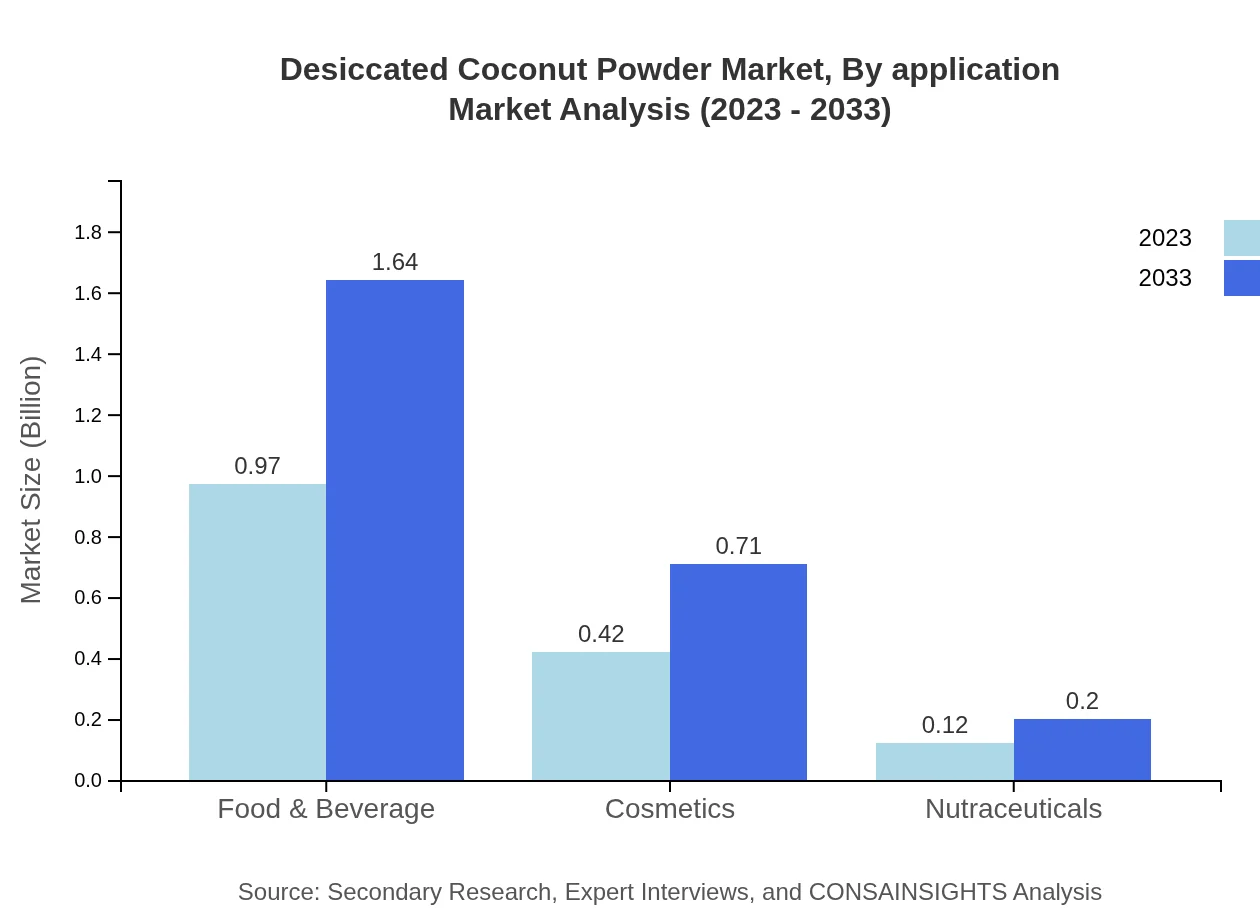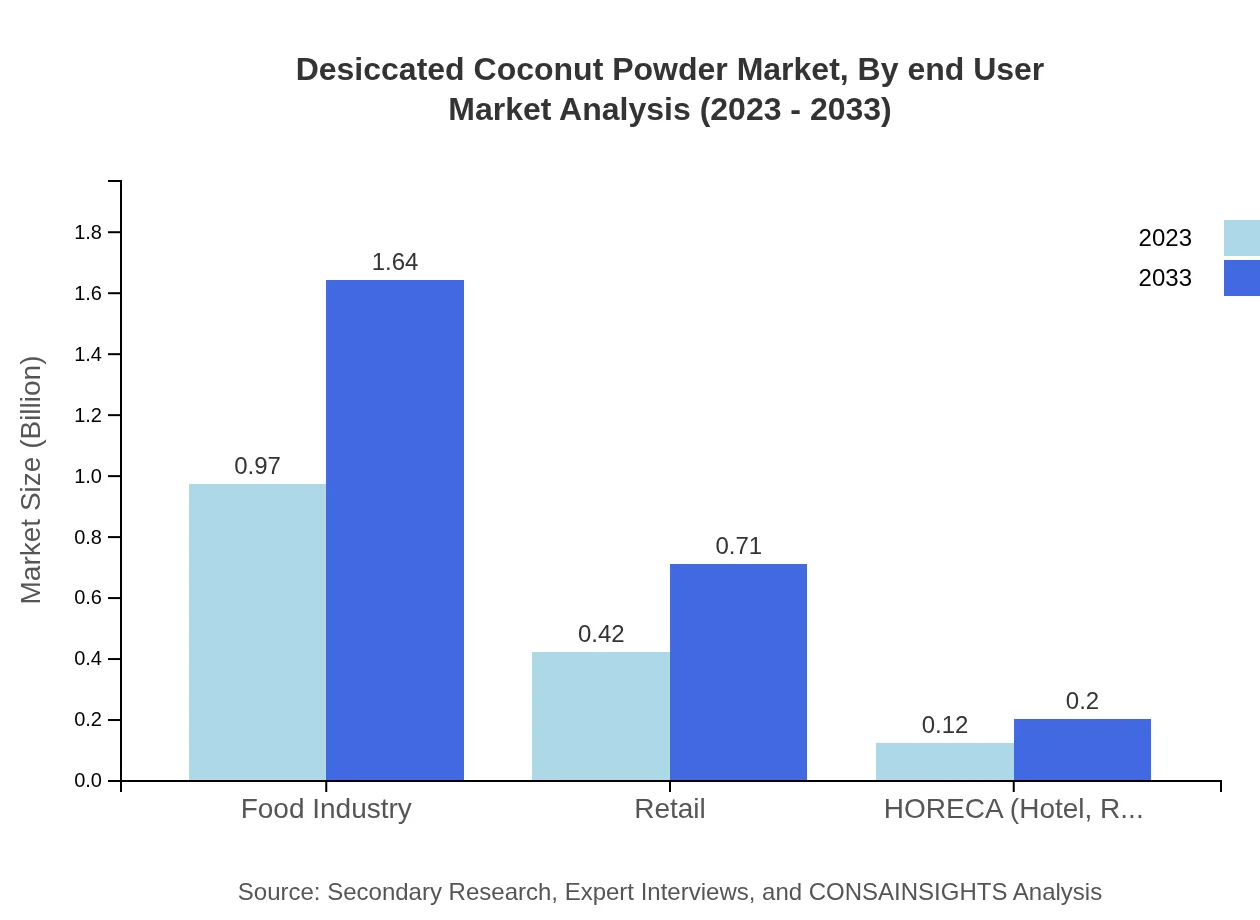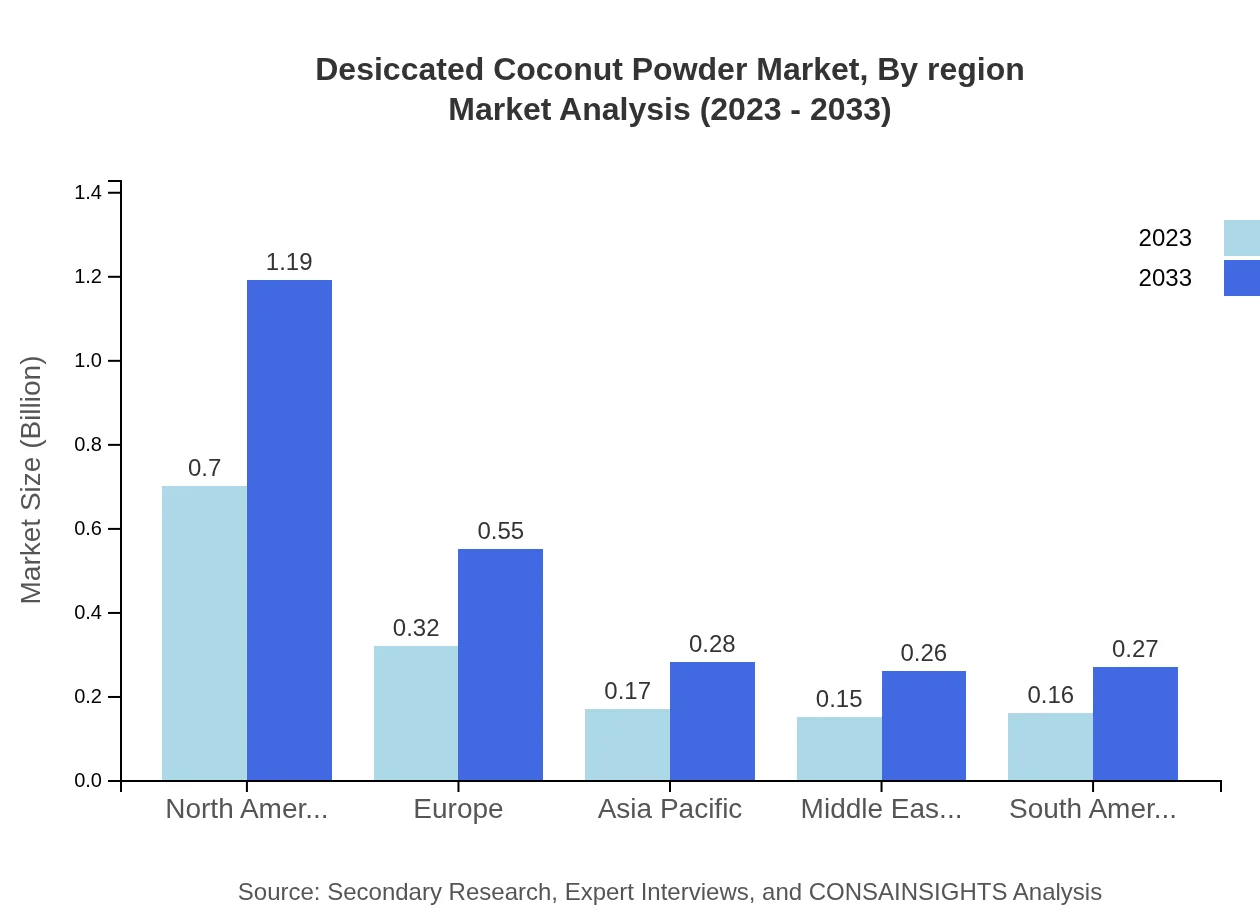Desiccated Coconut Powder Market Report
Published Date: 31 January 2026 | Report Code: desiccated-coconut-powder
Desiccated Coconut Powder Market Size, Share, Industry Trends and Forecast to 2033
This report provides a comprehensive analysis of the Desiccated Coconut Powder market, including key insights on market size, trends, forecasts for 2023 to 2033, and regional dynamics.
| Metric | Value |
|---|---|
| Study Period | 2023 - 2033 |
| 2023 Market Size | $1.50 Billion |
| CAGR (2023-2033) | 5.3% |
| 2033 Market Size | $2.54 Billion |
| Top Companies | Tropical Food Manufacturing Co., Nutiva, Inc., Coconut Company, Royal Forest Foods |
| Last Modified Date | 31 January 2026 |
Desiccated Coconut Powder Market Overview
Customize Desiccated Coconut Powder Market Report market research report
- ✔ Get in-depth analysis of Desiccated Coconut Powder market size, growth, and forecasts.
- ✔ Understand Desiccated Coconut Powder's regional dynamics and industry-specific trends.
- ✔ Identify potential applications, end-user demand, and growth segments in Desiccated Coconut Powder
What is the Market Size & CAGR of Desiccated Coconut Powder market in 2023?
Desiccated Coconut Powder Industry Analysis
Desiccated Coconut Powder Market Segmentation and Scope
Tell us your focus area and get a customized research report.
Desiccated Coconut Powder Market Analysis Report by Region
Europe Desiccated Coconut Powder Market Report:
Europe's market stands at $0.45 billion in 2023 with projections to hit $0.76 billion by 2033. The region is characterized by high demand for organic and natural food products, with desiccated coconut becoming a staple ingredient in various culinary applications.Asia Pacific Desiccated Coconut Powder Market Report:
In 2023, the Asia Pacific market for Desiccated Coconut Powder is valued at $0.27 billion, with expectations to reach $0.46 billion by 2033, fueled largely by demand in food applications and the growth of the health food trend across countries like India and Indonesia.North America Desiccated Coconut Powder Market Report:
The North American market is valued at $0.57 billion in 2023, expected to grow to $0.97 billion by 2033. The rise of the health-conscious demographic and the influx of coconut-based products in the retail sector are driving market dynamics.South America Desiccated Coconut Powder Market Report:
South America has a market size of $0.15 billion in 2023, projected to rise to $0.25 billion by 2033. The increasing use of coconut products in traditional recipes and a growing awareness of their health benefits contribute to this growth, particularly in Brazil and Argentina.Middle East & Africa Desiccated Coconut Powder Market Report:
The market in the Middle East and Africa is relatively smaller, valued at $0.06 billion in 2023 and expected to reach $0.10 billion by 2033. However, demand is gradually rising due to growing health awareness and a shift towards natural food products.Tell us your focus area and get a customized research report.
Desiccated Coconut Powder Market Analysis By Product
The market is predominantly segmented into three grades: fine, medium, and coarse. The fine grade leads the market, accounting for 64.38% of total sales in 2023, driven by its application in mainstream food products. The medium grade constitutes 27.81% of the market, primarily used in baking and confectionery. Coarse grade products, although accounting for a smaller percentage (7.81%), serve niche markets such as toppings and snack foods.
Desiccated Coconut Powder Market Analysis By Application
Applications vary across sectors such as food and beverage, cosmetics, and nutraceuticals. The food and beverage sector accounts for the largest share at 64.38% of the market, reflecting the growing incorporation of coconut-based ingredients in health foods. The cosmetics sector, representing 27.81%, utilizes coconut products for their moisturizing and skin-nourishing properties. Nutraceuticals also play a role in the market, making up 7.81%.
Desiccated Coconut Powder Market Analysis By End User
End-users of desiccated coconut powder include retail consumers, HORECA, and industrial applications. Retail consumers dominate with 27.81% of the market, reflecting a significant trend toward healthy eating. The HORECA sector, comprising hotels, restaurants, and catering services, takes a 7.81% share, indicating the product's use in professional kitchens. Industrial applications also contribute, particularly in large-scale food production.
Desiccated Coconut Powder Market Analysis By Region
The regional analysis reveals that North America, with a significant market size of $0.57 billion in 2023, continues to lead global consumption. Europe follows closely, supported by rising vegan and organic trends. The Asia Pacific region also shows promise, driven by culinary traditions incorporating coconut products, with both South America and the Middle East providing niche markets with growth potential.
Desiccated Coconut Powder Market Trends and Future Forecast
Tell us your focus area and get a customized research report.
Global Market Leaders and Top Companies in Desiccated Coconut Powder Industry
Tropical Food Manufacturing Co.:
A leading producer of desiccated coconut with a strong presence in North America and Europe, known for high-quality organic products.Nutiva, Inc.:
Specializes in organic coconut products, including desiccated coconut powder, catering to health-focused consumers.Coconut Company:
A significant player in the coconut industry, offering a diverse range of coconut products including various grades of desiccated coconut.Royal Forest Foods:
Focused on sustainable sourcing, Royal Forest Foods is a popular name for organic desiccated coconut products.We're grateful to work with incredible clients.









FAQs
What is the market size of desiccated coconut powder?
The global market size for desiccated coconut powder is estimated at 1.5 billion. It is projected to grow with a CAGR of 5.3% from 2023 to 2033, reflecting increasing demand and market expansion.
What are the key market players or companies in the desiccated coconut powder industry?
Key players in the desiccated coconut powder market include various regional suppliers and manufacturers focusing on product quality and innovation to capture market share effectively and meet consumer demand.
What are the primary factors driving the growth in the desiccated coconut powder industry?
Growth factors for the desiccated coconut powder market include rising health consciousness, increasing vegan and plant-based diets, and the expansion of food and beverage applications utilizing coconut products.
Which region is the fastest Growing in the desiccated coconut powder market?
The Asia Pacific region is projected to be the fastest-growing area, expanding from a market size of 0.27 billion in 2023 to 0.46 billion by 2033, emphasizing increased production and consumption.
Does ConsaInsights provide customized market report data for the desiccated coconut powder industry?
Yes, ConsaInsights offers customized market report data tailored to specific client needs in the desiccated coconut powder industry, enabling businesses to make informed decisions based on unique requirements.
What deliverables can I expect from this desiccated coconut powder market research project?
Expect comprehensive reports detailing market size, segment analysis, regional trends, key players, competitive landscape, and growth opportunities in the desiccated coconut powder market.
What are the market trends of desiccated coconut powder?
Current market trends in desiccated coconut powder include increased usage in health foods, expanding applications in cosmetics, and a rising trend towards sustainable sourcing and production practices.

